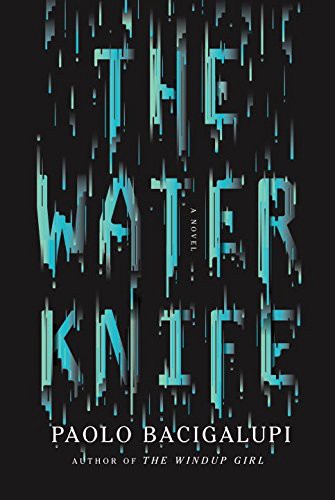The Water Knife, by Paolo Bacigalupi

The Water Knife is an extremely interesting near-future, post-apocalyptic take on the water problems faced by the American Southwest.
Angel Velasquez is a Water Knife — a vicious and not-quite-amoral enforcer who helps Catherine Case control the water rights and water supply from the Colorado river, on which everyone downriver depends. Lucy Monroe is a Pulitzer-nominated investigative journalist poking all the wrong people in Phoenix and California. Maria is a desperately poor migrant who’s made her way to Phoenix. When Angel is sent from Vegas to Phoenix to get his hands on some water rights, their paths collide in a brutal and violent exploration of what people will do to each other because of poverty, desperation, extreme conditions or just plain evil.
While The Water Knife lays this water shortage at the feet of man’s development and climate change, it turns out this isn’t the first time the Southwest has undergone drought. In fact drought led to the migration and eventual disappearance of the ancient Anasazi, the creators of Mesa Verde and Chaco Canyon. That drought created enormous social upheaval, migration and violence (a subject I covered a bit here and here, including extremely brutal mass killings and cannibalism).
http://www.viking2917.com/house-of-rain-by-craig-childs/
The Water Knife is a great read, no matter your point of view about climate change, urban development or water usage in the California and the southwest. It recalls the best of William Gibson’s cyberpunk masterpiece Neuromancer (is Catherine Case named after Case, the anti-hero of Neuromancer?). It’s an all-too-plausible extrapolation of the challenges facing California (often mis-reported as saying California will be out of water in a year). It’s a classic sci-fi/noir with a Southwestern flair. It’s an exploration of whether mankind is inherently evil, and a reminder that civilization might be a thin veneer over our violent natures. And it’s a fast, enjoyable read.
Bacigalupi’s characters occasionally veer a little too close to stereotypes (the bad guy redeemed by a woman, the muckraking journalist), but those are minor quibbles. Great read, and thought provoking.
If you’re wondering what to read next after The Water Knife, head over to this page. And in the non-fiction category, consider Cadillac Desert, a history of water in the southwest which features prominently in The Water Knife.
